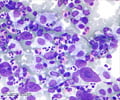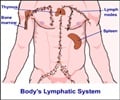A potential therapeutic target for non-Hodgkin's lymphoma, a type of cancer that affects lymphocytes, or white blood cells has been identified
A potential therapeutic target for non-Hodgkin's lymphoma, a type of cancer that affects lymphocytes, or white blood cells has been identified by scientists from Weill Cornell Medical College.
The research team insists with the newly discovered mechanism they could powerfully suppress tumour formation in lab testing and in animal models.The study results have led to the design of a clinical trial that will soon be under way to test a compound - called PU-H71 - in human patients. This compound is in a new class of drugs, called heat shock protein inhibitors.
PU-H71 was developed by Dr. Gabriela Chiosis, a principal author of the study, from the Memorial Sloan-Kettering Cancer Centre, in New York City.
"We observed almost complete tumour regression after treating the animals with PU-H71," Nature magazine quoted Dr Ari Melnick, associate professor of medicine from the Raymond and Beverly Sackler Centre for Biomedical and Physical Sciences at Weill Cornell Medical College as saying.
"I hope that clinical testing will have similar results for human participants," Melnick added.
During the study, researchers identified a molecule called heat shock protein 90 (Hsp90) that play a vital role in functioning of a protein called BCL-6, known to drive the activity of lymphoma tumour cells.
Advertisement
Blocking Hsp90 can have a powerful effect on BCL-6 production within the cell and, therefore, tumour formation.
Advertisement
The study appears in journal Nature Medicine.
Source-ANI
RAS









